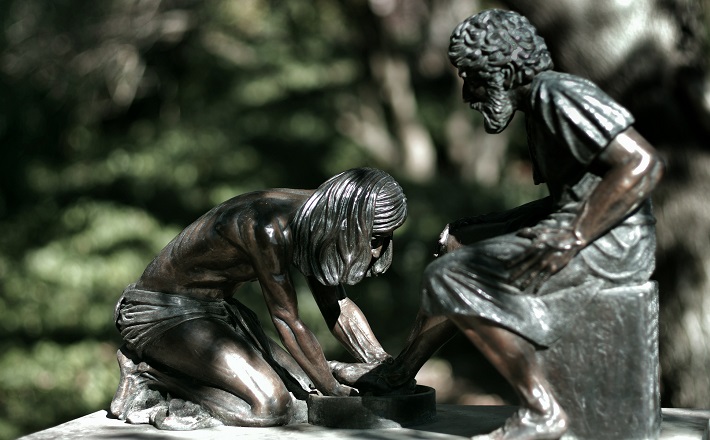Commentary on John 13:1-17, 31b-35
John’s story of Jesus washing the feet of the disciples is regularly assigned for Maundy Thursday.
The reasons for this are self-evident: it supplies the characteristic actions of faithful community and, along with it, the Johannine explanation of those actions.
To me, though, what is most striking is the “set-up” for what should have been a show down — or would have been a show down had it involved anyone but Jesus. After all, Jesus knows everything — knows that his hour to depart from this world had arrived; that he had loved his own to the end; and that now, finally, the “devil had put it into the heart of Judas son of Simon Iscariot to betray him” (verse 2).
Verse 3 offers a summary of Christ’s omniscience and power: “And during supper, knowing that the Father had given all things into his hands … ” When I read this tonight, it shocked me: Why would anyone do what Jesus did next knowing what he knows?
Consider our own day and age: “I’ve got the evidence! It’s the leak I was looking for — betrayal!” It’s the “smoking gun” or the incriminating tranche of e-mails.
We fully expect, perhaps, Jesus to stand up at the table, the last supper, and announce that this is all a fraud, and I know it, you know it, and I’ve got the evidence to prove it! And maybe part of us would like him to do so — to be a divine whistle blower. The marriage vows, a sham. The business agreement, not worth the paper it was written on. The bread we break, an empty show.
We have a word for this experience: betrayal. Betrayal stings. Anyone who has ever felt betrayed knows this — and knows how implausible Jesus’ reaction. At this moment, Jesus doesn’t “show them what they are” even though, according to John, Jesus knows what is in their hearts. Their betrayal is, indeed, exposed, but it is not a surprise to God. This is the least “revelatory” aspect of the text.
Dietrich Bonhoeffer marvels that we are continually surprised by sin, though it is as common in us as it is in anyone else.
Perhaps this is why John reserves the better part of this text to showing Jesus’ love — not our sin. What we get is not a “tranche of incriminating e-mails” but Jesus in the flesh, showing us who he is and, by implication, who we are to be for one another. John exerts remarkable narrative control in this text, hewing closely to his primary concern, revealing Jesus, the light that has come into the world.
If denial, betrayal, and crucifixion will dominate chapters 18-19, John deliberately constructs this scene so that we cannot miss it. In these quiet but unmistakable actions, we see Jesus’ physical movements which correspond to his oneness with the God of mercy: Jesus “got up from the table”; “took off his outer robe and tied a towel around himself”; “poured water into a basin” and “wash[ed] the disciples’ feet … and wipe[d] them with the towel that was tied around him” (4b-5).
Instead of exposing their hearts — not Judas’ or even Peter’s — he reveals himself as the one who loved his own to the end, even becoming a servant, knowing full well the mixed motives of his disciples.
Bonhoeffer’s Letters and Papers from Prison throw up a bounty of insights into this text, particularly from a pastoral application of this passage. Bonhoeffer warns against allowing ourselves to fall into contempt for humanity:
Whoever despises another human being will never be able to make anything of him. Nothing of what we despise in another is itself foreign to us … The only fruitful relation to human beings — particularly to the weak among them — is love, that is, the will to enter into and to keep community with them. God did not hold human beings in contempt but became human for their sake.1
In his book, The Racist Mind: Portraits of Neo-Nazis and Klansmen, Raphael S. Ezekiel poses the question of whiteness by trying to understand avowed racists. When the Neo-Nazi asks the question, “Who am I?” he answers the question in terms of race.
Ezekiel asserts that while whites may use more than one way of answering the question of identity (religious, vocational, gender, social class), the mentality of the avowed white racist does “resemble majority white perception by taking ‘race’ … as a biologically meaningful description of reality, and therefore a fundamental way to categorize people.” But white people often don’t see white racism in themselves:
We do not know, the old joke says, who discovered water, but we do know it was not a fish. Just so, in a society in which white folk predominate and are seldom challenged in everyday life, white Americans have little conscious awareness of being white or of what that might mean. Only the challenge or the crisis makes this categorization relevant. The militant white racist movement is composed of people who feel permanently in crisis.2
Perhaps the impending crisis of the betrayal and crucifixion invites preaching that searches congregational identity. John, himself, might come in for criticism given his frequent and negative use of the phrase, “the Jews.”
An African American theologian asked a room of mostly white seminary professors, “Have you thought about what it means to be white? Do your students ask this question of themselves or their congregations?”
From an African American theologian, it was a provocative and, I think, genuine question. Understanding ourselves, perhaps that part of our identity we would deny, is often only brought about by crisis or by love. If we would see Jesus, then we will also see through his eyes — not with contempt, but ultimately, with love. And yet, that love will be near us as well as strange to us.
Ezekiel, who self-describes as a Jew — raised in Texas — says that he sought to “understand” the people he interviewed. “I hate racism … but I have no trouble knowing that the racist is a completely comprehensible human: We went to school together.”3
Could that be part of the spectrum of godly love? And could Holy Week, a time of deep self-examination, also be a time in which pastors, in preaching and prayer, pose these sorts of questions for their congregations? Would provoking this spirit of reflection resemble the effect of Christ’s demonstration in this text?
Notes:
1 Dietrich Bonhoeffer, Letters and Papers from Prison in Dietrich Bonhoeffer Works, Volume 8 (Minneapolis: Fortress Press, 2010), 44-5.
2 Raphael S. Ezekiel, The Racist Mind: Portraits of Neo Nazis and Klansmen (New York: Penguin Books, 1995), xvii-xviii.
3 Ibid., xx.


April 13, 2017